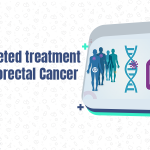Metastatic breast cancer (also called stage IV or advanced breast cancer) is not a specific type of breast cancer. Stage IV or metastatic breast cancer is known as the most leading stage of breast cancer.
Stage IV breast cancer is breast cancer that has progressed beyond the breast and surrounding lymph nodes to other areas or parts of the body (most oftenly in the lungs, bones, liver or brain).
What is Metastatic Breast Cancer:
Although metastatic or stage IV breast cancer has progressed to other areas of the body, it’s still breast cancer and must be treated as breast cancer.
For instance, breast cancer that has progressed to the bones is still breast cancer (not bone cancer). The cells of breast cancer have invaded the bones. It’s not as common as cancer that begins in the bones. So, it should be treated with breast cancer medicines rather than medications for cancer that starts in the bones.
In case you’ve been diagnosed with metastatic or stage IV breast cancer, then you’re not alone. It’s estimated there were over 168,000 women living with metastatic or stage IV breast cancer in the United States in 2020 (most recent estimate available). Men can also get metastatic (stage IV) breast cancer.
When Can Metastatic Breast Cancer Occur:
Some individuals have metastatic breast cancer (also known as stage IV or advanced breast cancer) when they are initially diagnosed with breast cancer (approximately 6 % of diagnoses in females and 9 % of diagnoses in males in the United States). This is typically known as de novo metastatic breast cancer.
Commonly, metastatic breast cancer arises years after an individual has completed treatment for previous or locally advanced breast cancer. This may be known as a distant recurrence.
A diagnosis of stage IV or metastatic breast cancer is not an individual’s fault. The respective individual did nothing to cause this cancer to progress or spread.
The stage IV breast cancers come from the cells of breast cancer that remained in the body after treatment for early breast cancer. The breast cancer cells were always there but could not be detected. For some unknown reason, the cancer cells began to grow again. This process is not well-understood.
The Probability of Metastatic (Stage IV) Breast Cancer:
The probability of metastasis following the treatment of breast cancer varies from individual to individual. It depends on:
- The biology of the tumor (characteristics of the cancer cells)
- The stage at the time of the original diagnosis
- The therapies for the original cancer (trying to prevent breast cancer recurrence)
Metastatic (Stage IV) Breast Cancer Prognosis (Chance of Survival):
New era’s treatments continue to improve the survival for those with metastatic breast cancer. However, survival varies greatly from individual to individual.
About one-third of females diagnosed with metastatic or stage IV breast cancer in the United States live at least 5 years after diagnosis. Some females may live 10 or more years beyond diagnosis.
An oncologist can tell you about your prognosis, but they also don’t know exactly how long your chance of survival would be.
Metastatic Breast Cancer Treatment
As tough as it is to hear, metastatic (stage IV) breast cancer is hard to be cured. Unlike breast cancer that stays in the breast or surrounding lymph nodes, medical therapies can’t get rid of all the cancer that progressed to other organs of the body.
Although, metastatic or stage IV breast cancer can be treated. The goal of treatment is to extend life and maintain quality of life (QoL).
A treatment plan is typically guided by several factors, including:
- Characteristics of the cancer cells
- Where the cancer has spread
- Your signs/symptoms
- Previous breast cancer treatments
- Your age, overall health, menopausal status and other medical complications
- Personal goals and preferences
Drug Therapies for Metastatic (stage IV) Breast Cancer
There are several drug therapies that can be used to treat metastatic (stage IV) breast cancer. Let’s learn about drug therapies that may be part of your treatment plan.
Hormone therapy (endocrine therapy): Progesterone and estrogen are female hormones formed in the body. Some breast cancer cells need progesterone/estrogen to grow.
When progesterone/estrogen attach to special proteins known as hormone receptors, the cancerous cells with these receptors progress.
These (hormone therapy) medicines work by preventing the cancerous cells from getting the estrogen they need to progress.
Hormone therapies can be addressed as endocrine therapies. This therapy is typically the first treatment for hormone receptor-positive (HR+) metastatic breast cancers.
For those (women), the choice of hormone therapy typically depends on menopausal status and any previous hormone treatment for early breast cancer.
Some hormone therapy medicines are pills and some are administered by injection under the skin (a shot). Most widely used hormone therapy drugs are as follows:
Anastrozole (Arimidex): Anastrozole is supplied under the brand name Arimidex. It is used in the postmenopausal women. This medicinal product is available as a pill.
- Pembrolizumab (Keytruda): Pembrolizumab is supplied under the brand-name Keytruda. It is a checkpoint inhibitor immunotherapy antibody medicine widely used for the treatment of some metastatic breast cancers.Other immunotherapy medicines for treating metastatic breast cancer are under study.
- HR-negative
- HR-positive, but no longer respond to hormone therapy
- HER2+ (along with HER2-targeted therapy)
- Capecitabine (Xeloda)
- Cisplatin (Platinol)
- Cyclophosphamide (Cytoxan)
- Carboplatin (Paraplatin)
- Docetaxel (Taxotere)
- Epirubicin (Ellence)
- Eribulin (Halaven)
- Doxorubicin (Adriamycin)
- 5-Fluorouracil (Adrucil)
- Ixabepilone (Ixempra)
- Liposomal doxorubicin (Doxil)
- Gemcitabine (Gemzar)
- Methotrexate (Maxtrex)
- Paclitaxel, albumin bound, also called nab-paclitaxel (Abraxane)
- Vinorelbine (Navelbine)
- Paclitaxel (Taxol)






